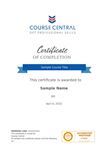
Accounting: fundamental accounting for small business
Essential Accounting processes demonstrated by a qualified and experienced Accountant and Skill Trainer
Course Central
Summary
- Certificate of completion - Free
- Tutor is available to students
Add to basket or enquire
Overview
A fundamental course in Accounting for small businesses covering all essential debits and credits, a double-entry system, five account types, creating and reading balance sheets, profit & loss statements, checking accounts with a trial balance and an 8-step accounting cycle for anyone with any skill-set to use the application confidently as a professional.
A qualified accountant has developed this course on how to use accounting to your benefit to understand how your business grows, makes money, where the profit of a company goes, and what your cash flow is.
The fundamentals of accounting include record keeping which is the primary function of accounting. You can explore the role of accounting in business, identify several accounting disciplines, and use standard accounting terms of practical knowledge for the company to decide on, analyse, share, demonstrate, and make futuristic plans, investments, expansion and growth in any sector. All you need is to master the skill of handling data.
A solid and robust accounting foundation will give you the knowledge and skills to be your best for your career. To manage a business, one needs a 360-degree understanding of accounting fundamentals. This course started with essential insights for professionals.
This entirely online course has expanded on data visualisation of many sorts as it suits your need.
You can start with any skill set and will reach the next level at the end of this course. Solid accounting knowledge will prepare you to understand financial statements and their use in making management decisions and directing the business.
You will be able to do the following after completing this course:
- Fundamentals of Accounting
- First-Hand understanding of Financial Statements
- Accounting Policies and their effect on accounting methods Meaning & Basic understanding of All financial statements
Why Choose Our Executive PA course?
- Conducted by industry experts
- Get Instant E-certificate
- Entirely online, interactive course with Professional voice-over
- Developed by qualified professionals
- Self-paced learning and laptop, tablet, smartphone friendly
- 24/7 Tutor Support
And you will also get these gifts
- Free PDF Certificate
Course media
Description
Course Curriculum
Understand Fundamentals of Accounting
- WHAT IS FINANCIAL ACCOUNTING
- DOUBLE ENTRY & ACCOUNTING RULES
- ACCOUNTING PROCESS AND INTRODUCTION TO FINANCIAL STATEMENTS
- WHAT IS ACCOUNTING EQUATION AND HOW FINANCIAL STATEMENTS ARE LINKED
- SUMMARY AND CLASSIFY THE ACCOUNTS
- INTERNAL TRANSACTIONS – DEPRECIATION AND ACCRUALS
- SAMPLE TRANSACTIONS IN ACCOUNTING – EXCERCISE DONE TOGETHER
Accounting Policies and Their Impact on Accounting Profit
- KEY ACCOUNTING POLICIES
- DEPRECIATION POLICIES
- CONTROLLING ASPECTS OF FIXED ASSETS OF BUSINESS
- INVENTORY ACCOUNTING & CONTROLS
- REVENUE ACCOUNTING POLICY AND SEGMENTATION
- EXPENSES ACCOUNTING AND WORKING CAPITAL CONCEPTS
Certificates
Course Central is proud to offer a Certificate of Completion to all who complete courses successfully. Course Central tracks the learner’s course progress. However, the learner is responsible for validating the completion and understanding of the course. All Certificates of Completion can be validated from the Course Central website using the validation code.
Transcripts
A Transcript for the course with completed module details can be requested for as little as £4.99. Please note that all course Certificates and Transcripts will be titled as published on the Course Central platform.
Who is this course for?
Accounting plays a vital role in running a business because it helps to track income and expenditures, ensure statutory compliance, and provide investors, management, and government with quantitative financial information to make business decisions. It can be used in daily life because it maintains and expands the financial health of a business.
Accounting is a process that involves recording the financial transactions related to business. The process includes summarising, analysing and reporting these transactions to regulators. Agencies and tax collection entities.
Startup founders and co-founders, small business owners, business executives with no formal background in accounting and one from any background can explore this fundamental accounting.
Requirements
Existing qualification level: No specific previous qualification is required. However, a basic understanding of Maths, English and ICT would benefit in understanding the content.
Existing skill levels: Minimum ICT skills to operate any computer system is beneficial. No skill in working with Accounting is essential.
Technical requirements: Access to any computer or laptop would benefit from practising and following the instructions.
Career path
The accounting field offers a wide array of career options, from auditing, tax accounting and cost accounting to managerial accounting, with several professional certifications for each. There are also opportunities in public accounting, government agencies or corporations, and entrepreneurship.
The salary expectation can grow from £30,000 per annum to £52,000 per annum.
Questions and answers
Currently there are no Q&As for this course. Be the first to ask a question.
Certificates
Certificate of completion
Digital certificate - Included
Reviews
Currently there are no reviews for this course. Be the first to leave a review.
Legal information
This course is advertised on reed.co.uk by the Course Provider, whose terms and conditions apply. Purchases are made directly from the Course Provider, and as such, content and materials are supplied by the Course Provider directly. Reed is acting as agent and not reseller in relation to this course. Reed's only responsibility is to facilitate your payment for the course. It is your responsibility to review and agree to the Course Provider's terms and conditions and satisfy yourself as to the suitability of the course you intend to purchase. Reed will not have any responsibility for the content of the course and/or associated materials.



